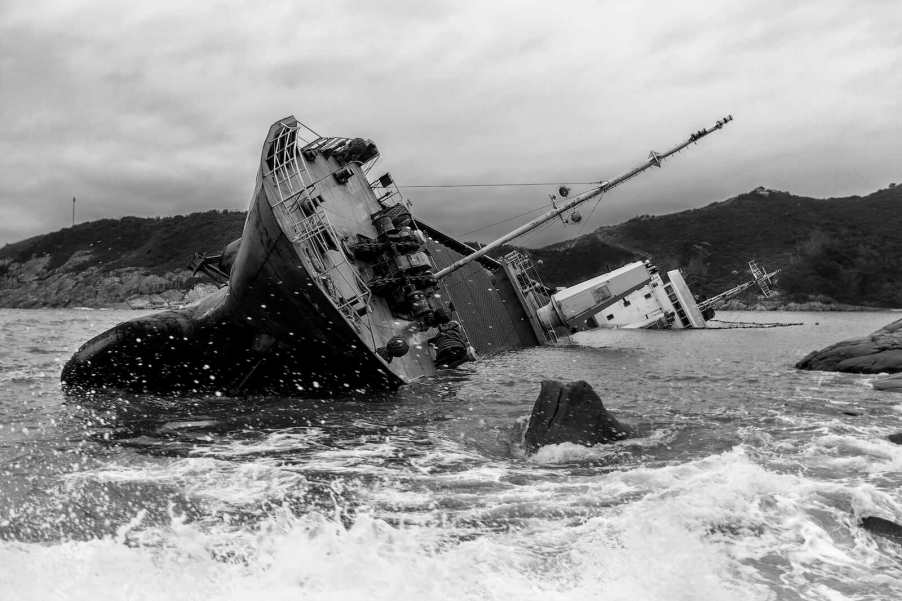
Does the captain still have to ‘go down with the ship?’
We’ve all seen it in movies—chaos on deck as passengers scramble for lifeboats, the ship sinking beneath the waves, and the captain standing stoically at the wheel, prepared to meet their watery fate. But is there really a law that says a captain has to go down with their ship?
The short answer: No, there’s no such law. The idea that a captain must perish with their vessel is rooted more in maritime myth and tradition than any legal requirement. But while there’s no rule about a captain sacrificing themselves, there are real consequences for abandoning a ship—and the crew and passengers—before ensuring their safety.
Let’s bust this myth and explore what the law actually says.
Where the Tradition Comes From
The image of the captain heroically staying behind as the ship sinks has been romanticized for centuries, but it likely didn’t become a widespread expectation until the 1800s. High-profile disasters, like the sinking of the HMS Birkenhead and the Titanic, cemented the idea in the public imagination that a captain’s duty is to go down with the ship.
The truth is, while maritime tradition holds that the captain is ultimately responsible for their vessel and everyone aboard, no laws anywhere explicitly state that they must go down with it. The real obligation lies in ensuring the safety of passengers and crew—and the ship if there’s any chance of saving it. If a captain abandons a working vessel without trying to save it or the people onboard, that’s when the law steps in.
What the Law Actually Says
So, if there’s no law about a captain dying with the ship, what do the rules say about their responsibilities? Many countries, including those with long-standing maritime traditions like Spain, Greece, Italy, South Korea, and Finland, have laws about abandoning a vessel. These laws require the captain to be the last person to leave the ship, ensuring that all passengers are evacuated and all efforts to save the ship have been exhausted.
In cases where the ship is truly lost, like a sinking with no hope of recovery, the captain isn’t expected to stay on board. However, leaving too early or failing to assist in the rescue effort can lead to severe penalties.
The U.S. and international maritime law don’t have specific rules against captains abandoning ship, but the concept of duty is paramount. A captain’s responsibility to the crew and passengers is absolute. If they abandon ship and leave people behind to die, they can be charged with serious crimes, including manslaughter. And if the abandoned ship causes damage to people or property, the captain can be held liable.
The Case of Captain Francesco Schettino
One modern example of a captain facing consequences for jumping ship too soon is the infamous Costa Concordia disaster in 2012. The ship ran aground off the coast of Italy, and while hundreds of passengers were still onboard, Captain Francesco Schettino left the scene in a lifeboat. Ultimately, 32 people died in the wreck.
Schettino was sentenced to 16 years in prison, including one year for abandoning his ship. His actions were widely condemned in the media, earning him the nickname “Captain Coward.” But while his behavior was clearly criminal, it wasn’t because he failed to go down with the ship—it was because he abandoned his duty to ensure the safety of those still on board.
The intense public backlash Schettino faced likely stemmed from this deep-rooted myth. People expected him to stay with the Costa Concordia, even if it meant his life, but the law only demanded he do everything he could to save passengers before leaving. The fury around his actions highlights how the myth of the self-sacrificing captain still lingers in public perception.
Why the Myth Persists
Part of the reason this myth is so persistent comes down to the symbolic weight of a ship’s captain. They are seen as the ultimate authority on board, and with that comes the expectation of ultimate sacrifice. The sinking of the Titanic in 1912 solidified this image, as Captain Edward Smith famously went down with the ship after ensuring passengers had the best chance of survival.
But legal systems across the world, from South Korea to Finland, don’t expect captains to die for their ships. Rather, they expect captains to protect lives and salvage the vessel when possible. While it makes for a dramatic scene in films and books, the actual duty of a captain is far more practical—and far less glamorous.
The Captain’s Real Responsibility
So, do captains have to go down with their ships? Not at all. The law doesn’t demand sacrifice but it does demand accountability. A captain must protect lives and do everything they can to save their vessel. If they abandon ship before fulfilling that duty, there will be consequences. But going down with the ship? That’s just a myth, born from romanticized stories of maritime heroism and disaster.
The real responsibility of a captain isn’t about dying with the ship—it’s about ensuring that as many people as possible live to tell the tale.



